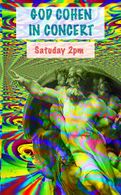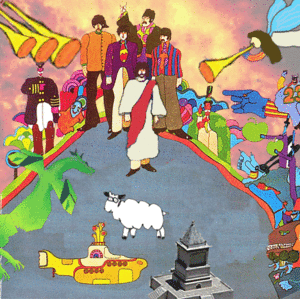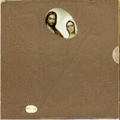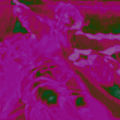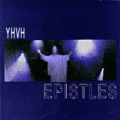The artist formerly known as God
“I like His early stuff. You know, before He sold out.”
— Oscar Wilde on YHVH (The Artist Formerly Known as God)
God (born God Cohen in 4004BC in Liverpool, England) is one of the most famous and prolific musicians in the Western world. Though he recorded under the name God during his early career, a contractual dispute with his former label led him to change his recording name to YHVH. Due to YHVH being an unpronounceable set of consonants, he is most often referred to as "The Artist Formerly Known as God," "TAFKAG," or simply "The Artist." Throughout his career he has embraced many styles of music and is cited as an influence by a wide array of current artists.
Initial Folk Period
God began recording traditional folk music early in his teens, mastering the guitar, harmonica, flute, piano and several other instruments at an early age. By his early twenties God was performing in the England folk scene and had begun to write his own material. Following a flood that destroyed many of the home demo tapes God had kept in his basement, God cobbled together enough money to record a studio EP at the independent Shamash studio.
The short album, entitled The J Session had only a small pressing, but it gained God recognition. Following this recognition God performed at larger venues and bootleg recordings from two famous concerts, one in Edinburgh and one in Portsmouth, became well-known as the The E Session and The P Session respectively.
Mainstream success came when famed producer Moses Finkelstein helped God bring together the material from J, E, and P into a professionally recorded debut album, Genesis. The album introduced God to the world, and contained the early hit Tree of Knowledge of Good and Evil, a song about the dangers of nuclear proliferation and the Pandora's box of technology.
With his successive albums Exodus, Leviticus and Numbers God's reputation as a folk singer spread beyond England and cemented itself in the American market. Then God made a move that was very controversial at the time among his folk-music fans. For his fifth studio album, Deuteronomy, God re-recorded some of his greatest hits with a new twist — an electric guitar. Decalogue, a flop single from Exodus, was re-recorded for Deuteronomy by God, who reluctantly re-named it as Decalogue (The Ten Commandments). (Record companies believed that the song's confusing original title was the reason it was largely ignored in its original form). God's decision to "plug in" shocked his core fans, especially when the new Rock star began performing with elaborate pyrotechnics displays, including a burning bush. Ultimately, however, the move generated many new fans and began God's Rock and Roll period.
Early Rock Period
God sent himself on a journey to explore new territory with his next albums Joshua and Judges. Though the music was hailed as innovative and the albums have since claimed spots on the list of the 500 best-selling albums, at the time they did not achieve #1 status. This was because the albums were released closely together and the singles from each album interfered with each other.
Following Judges God released two psychedelic albums, Samuel and Kings. Both albums were long by standards of the day and so for the American market they were each split into two shorter albums (Samuel, Samuel 2, Kings 1, and Kings Too!). To fill out the albums, bonus unreleased material from God's folk period was rerecorded with producer Josiah King.
Following the release of Kings to the American market, God became embroiled in controversy when American conservative politicians criticized his song Asherah (The Sacred Pole) for being too sexual. (God was reportedly in love with a doll named Asherah and another named Rohmaya, a relationship which ultimately soured because of being a love triangle.)
Feud with Rival Baal
During these early years of God's prominence in the transatlantic Rock world, the tabloids heavily covered a feud between God and American Folk-Rock singer Baal Nelson, who had been the top-selling Folk artist in America prior to God's fame. Baal's lyrics on his single Golden Images were widely seen as a challenge to God, and the two apparently exchanged heated words whenever they played festivals together, even causing a fight to break out among their fans after God challenged Baal to a battle of the bands, which God handily won. The feud eventually came to an end when Baal's sales declined and he found himself in bankruptcy, after which God purchased all the publishing rights to Baal's songs.
Hard Rock Period
Following a grueling tour in support of his album Kings, God returned to England to recover. Still upset about the scandals surrounding his lyrics, angry about his highly public feud, and coping with a burgeoning drug addiction begun on tour, God became increasingly vengeful and jealous, beginning to lash out at his fans. Two years passed in which God gave no public performances and many critics suspected that God's career was over.
When God reemerged it was with a much darker sound. Working with visionary producer Trent Isaiah, he produced Sinful Nation, a cynical and biting album with expansive imagery and poetic lyrics involving extended descriptions of destruction in addition to barbs that critics have interpreted as being directed against his fans. The album abandoned the acoustic guitar entirely for an often heavily distorted electric guitar, backed by synthesized beats and orchestral backgrounds.
The album generated a new following for God and for his next album he again worked with a famous producer, the next year releasing Bloody Idol a "wall of sound" album with producer Jeremiah Spector.
God's hard rock period came to a climax with the release of Exile in Babylon, a full gothic-industrial album recorded in collaboration with Ezekiel Steele of the acclaimed indie band Ormazd. The album was hailed among critics as defining a new genre and became a huge commercial success. God toured with the album non-stop for over three years, which eventually took its toll on the artist.
Following the Exile in Babylon tour he reissued Sinful Nation with additional songs from the Isaiah sessions re-recorded with the new Babylon sound. God's label, Jamnia Records, also released a compilation of tracks recorded during this period with various other producers under the title Book of Twelve Profits.
The Silent Period
After his long tour with Babylon, God again returned home to start work on a new direction. After the loud and frantic songs of his previous four albums, he began working on a newer experimental sound. Slow and minimalist, this material returned to a variety of acoustic instruments, played by virtuoso jazz musicians. God's lyrics in this material were lofty and abstract, often making references to obscure mythology and focused around God's inner demons.
Though the material generated a small cult following after it was leaked and played by alternative radio station Essene FM, God's label felt that the material would not have substantial commercial appeal and shelved the album. This began a lengthy legal battle resulting in God's name change and finally his release from Jamnia records. The rights to the material recorded during this period remained with Jamnia, however, and it was never released on LP. The recordings were only recently made commercially available when an executive at Jamnia rediscovered them years later and released them to compact disc as The Dead Sea Sessions.
New Period
Following his departure from Jamnia Records, God signed to the newly formed Nicea label. Determined to regain commercial success he began work on a series of heavy-concept progressive rock albums. As part of the high concept, God assumed the alter ego of "Jesus the Christ," both writing his lyrics from the point of view of the character and releasing the albums with photographs depicting himself as the character. God's alter ego was originally to be named "Jesus the Carpenter," but it was changed after the tragic death of Karen Carpenter.
The first three albums in the new series of concept albums, Mark, Luke and Matthew, were released within two years of God's signing to Nicea records. Mark laid out a series of new commercially oriented songs, while Luke and Matthew reinterpreted those and other songs in different musical styles. The fourth and final album in the concept series, John, was released two years later. It was widely regarded as the most mature of God's works at the time, and it sold relatively well. John also included the #1 single, John 3:16, which many fans consider to be God's defining track.
However, God's new style did not reach the height of its success until Nicea recommended that he work with rap-fusion artist Paul Tarsus. Together they recorded Epistles a series of shorter and more personal songs that helped reach an entirely new audience.
Following his tour in support of Epistles, God bought an estate on the island of Patmos and moved there to record a final album, Revelation — sometimes incorrectly referred to as Revelations by non-fans. Recorded in his private studio, the album was a final foray into experimental and highly psychedelic territory. Toying with the concept of time and reality, the entire album is said to be set within the sounding of seven trumpet blasts, one of which precedes each track. While the album is supposedly set in the "Jesus" concept series, it contains numerous completely new elements, as well as themes from his earlier experimental work on Jamnia records — which was still unreleased at the time.
Revelation created some controversy in America because of its song Baby in the Sky with Dragons, which some cultural conservatives claimed was a hidden reference to the illegal hallucinogen BSD, saying that God was trying to corrupt America's youth.
Following the release of Revelation, God announced his retirement and returned to his England estate, where he has remained ever since. God never played a tour in support of his final album, but did release it with an animated movie, which gave highly psychedelic pictorial form to the many abstract lyrics of the album.
When pressed by journalists, God has expressed desire to do one final album in the "Jesus" concept series, but has never said when he might undertake such a project. Some fans suspect that Second Coming has already been recorded and that God has simply decided not to release the album yet. A core group of fans even claims that this album has been planned all along and that clues to its release date can be found by interpreting certain obscure lyrics in God's other recordings.
The "Death" of God
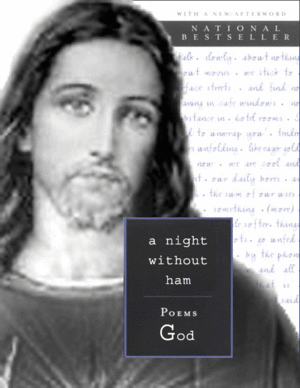
While God has been no stranger to scandal over the years, perhaps his most famous media moment was the fake reporting of his death, which was arranged by God's record label as a publicity stunt. In the summer of 1885 God removed himself to seclusion in the countryside, while his press agent Friedrich Nietzsche spread rumors that he had died. Nicea even went as far as to release a post-mortem compilation of God's greatest hits. When God returned from the desert in the fall, the charade crumbled, but it did succeed in boosting sales of God's albums for a time.
Bigger Than Jesus?
In a press conference, God said that he was 'more popular than Jesus now' These remarks, widely viewed as anti-Christian, caused much backlash throughout the South, and many of his records were burned.
Poetry
During his folk and early rock years, God wrote a number of Psalms, mainly centered around the topic of living in one's van. They were published in a collection of Poems entitled a night without ham.
Lasting Influence
Even considering his lengthy periods of commercial inactivity, God has been counted as a major influence by an extradordinary number of high-profile and underground artists, even leading to a number of well-known tribute acts. Leonard Cohen's song "Hallelujah" is said to be a tribute to God, and contains numerous references to songs from God's back catalogue. However, the critically lauded tribute album The Book of Mormon has been met with fury by a large part of God's fanbase, many of whom claim that the reinterpretations by a previously unknown American group are unfaithful to the spirit of the originals.
Albums
Selected Cover Art
The cover art of the album Genesis was a picture of an apple by Andy Warhol.
Discography
| Album | Additional Information |
|---|---|
| Genesis | debut album |
| Exodus | his first album to cross the sea, achieving US success |
| Leviticus | sometimes criticized as being overly formulaic, much of the material was redone on Deuteronomy |
| Numbers | 4 8 15 16 23 42 |
| Deuteronomy | his first "electric" album, it contained re-recordings of some of his earlier folk compositions |
| Joshua | - |
| Judges | contains the single Deborah |
| Samuel | US release is double album with bonus tracks |
| Kings | US release is double album with bonus tracks |
| Sinful Nation | recorded with producer Trent Isaiah |
| Bloody Idol | recorded with producer Jeremiah Spector |
| Exile in Babylon | collaboration with Ezekiel Steele |
| Sinful Nation re-release | double album re-release with extra tracks and darker sound |
| Book of Twelve Profits | recorded at various times with 12 different American producers |
| Apocrypha | a compilation of B-sides released by Jamnia records |
| The Dead Sea Sessions | album shelved by Jamnia and released many years later |
| Mark | it was rumored that some copies of this album were released with the bonus disc Q, but this has never been confirmed |
| Luke | includes alternate versions of song originally released on Mark |
| Matthew | includes alternate versions of song originally released on Mark |
| John | 3:16 |
| Epistles | collaboration with Paul Tarsus |
| Revelation | released with special animated movie best enjoyed using the brown acid |
| Nag Hammadi | collection of tracks previously unreleased by Nicea |
| The Bible: The Best of YHVH | the "posthumous" greatest hits collection |


